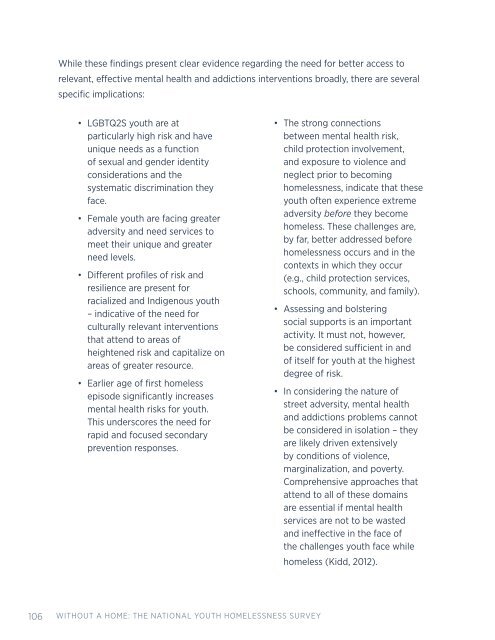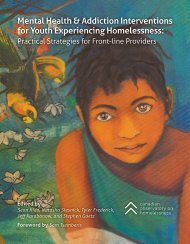Without A Home: The National Youth Homelessness Survey
You also want an ePaper? Increase the reach of your titles
YUMPU automatically turns print PDFs into web optimized ePapers that Google loves.
While these findings present clear evidence regarding the need for better access to<br />
relevant, effective mental health and addictions interventions broadly, there are several<br />
specific implications:<br />
• LGBTQ2S youth are at<br />
particularly high risk and have<br />
unique needs as a function<br />
of sexual and gender identity<br />
considerations and the<br />
systematic discrimination they<br />
face.<br />
• Female youth are facing greater<br />
adversity and need services to<br />
meet their unique and greater<br />
need levels.<br />
• Different profiles of risk and<br />
resilience are present for<br />
racialized and Indigenous youth<br />
– indicative of the need for<br />
culturally relevant interventions<br />
that attend to areas of<br />
heightened risk and capitalize on<br />
areas of greater resource.<br />
• Earlier age of first homeless<br />
episode significantly increases<br />
mental health risks for youth.<br />
This underscores the need for<br />
rapid and focused secondary<br />
prevention responses.<br />
• <strong>The</strong> strong connections<br />
between mental health risk,<br />
child protection involvement,<br />
and exposure to violence and<br />
neglect prior to becoming<br />
homelessness, indicate that these<br />
youth often experience extreme<br />
adversity before they become<br />
homeless. <strong>The</strong>se challenges are,<br />
by far, better addressed before<br />
homelessness occurs and in the<br />
contexts in which they occur<br />
(e.g., child protection services,<br />
schools, community, and family).<br />
• Assessing and bolstering<br />
social supports is an important<br />
activity. It must not, however,<br />
be considered sufficient in and<br />
of itself for youth at the highest<br />
degree of risk.<br />
• In considering the nature of<br />
street adversity, mental health<br />
and addictions problems cannot<br />
be considered in isolation – they<br />
are likely driven extensively<br />
by conditions of violence,<br />
marginalization, and poverty.<br />
Comprehensive approaches that<br />
attend to all of these domains<br />
are essential if mental health<br />
services are not to be wasted<br />
and ineffective in the face of<br />
the challenges youth face while<br />
homeless (Kidd, 2012).<br />
106<br />
WITHOUT A HOME: THE NATIONAL YOUTH HOMELESSNESS SURVEY

















